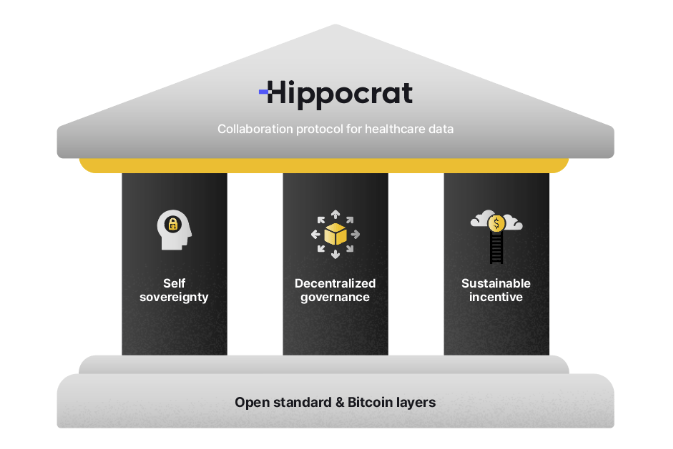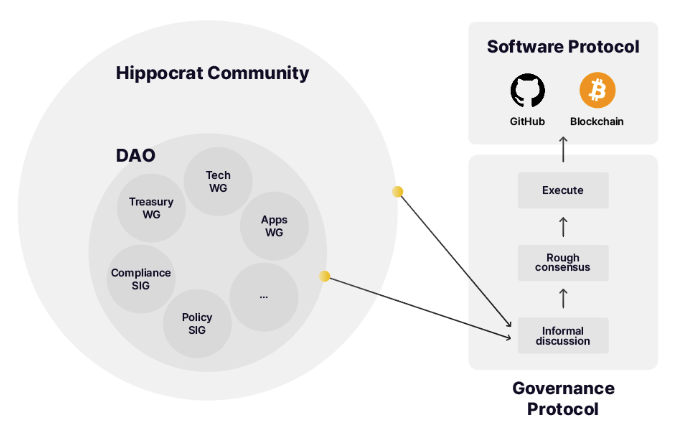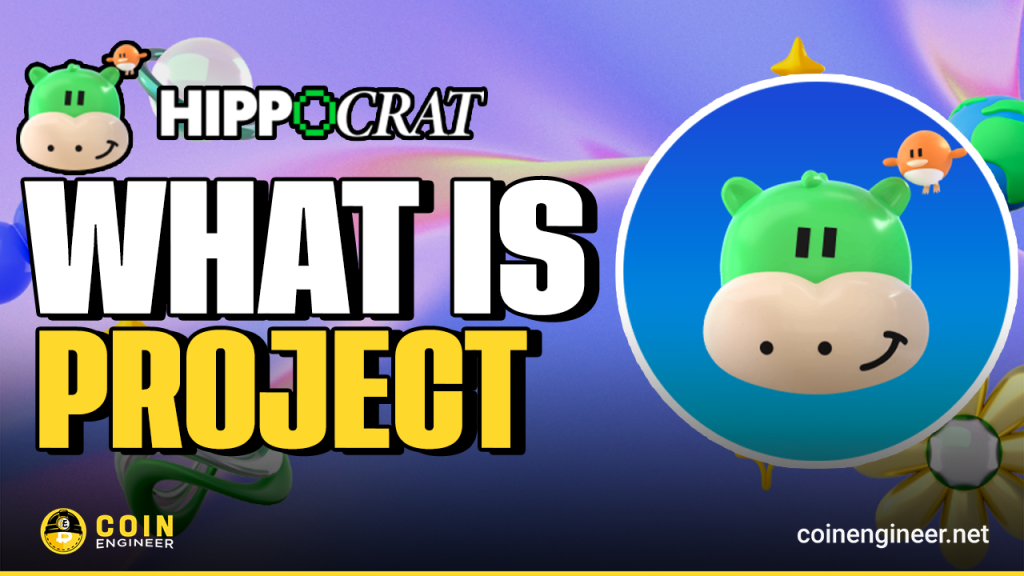Hippocrat (HPO) operates within the Hippocrat ecosystem, which focuses on providing data sovereignty to healthcare patients. This token is used on a platform designed to securely manage health data and ensure individuals have full control over their own health information. Let’s explore what Hippocrat (HPO) is and what it does in detail.
What is Hippocrat (HPO)? What Does it Do?
Hippocrat (HPO) is a project that transforms the healthcare sector by enabling individuals to control their health data through blockchain and zero-knowledge proof technologies. Within the HPO ecosystem, personal ownership of health data not only enhances the quality of personalized medical care but also contributes to the global healthcare landscape.
Aiming to address the problem of isolated health data, Hippocrat seeks to provide data sovereignty to millions of patients worldwide, unlocking the value of currently underutilized health data.
The HPO token rewards data owners who share their health data, giving them control over their personal information. Data consumers can purchase and use HPO tokens within the ecosystem, supporting a collaborative protocol for health data built on open standards and Bitcoin.

Hippocrat (HPO): Technology and Global Collaboration in Healthcare Services
Hippocrat combines blockchain and cryptography technologies to manage health data. Its decentralized ledger ensures data privacy and security, enhanced by technologies like the Lightning Network, Liquid Network, and zero-knowledge proofs. Additionally, ION is used for secure identity management, and Taro integrations aim to digitize medical records.
This infrastructure enhances trust, empowers individuals with data control, and fosters collaboration through telemedicine and health data sharing, while supporting the ecosystem with transactions, staking, and rewards.
Hippocrat (HPO) has taken significant steps to improve public health and promote data sovereignty through blockchain. With a strategic plan emphasizing global collaborations, it has established its identity in the cryptocurrency space.
Partnerships with Conflux Network, PANO, and international organizations have increased Hippocrat’s potential, contributing to its technological growth. These collaborations strengthen Hippocrat’s goal of providing secure and decentralized healthcare solutions.

Click here to get project’s white-paper document.
Hippocrat (HPO), Self Sovereign Identity (SSI) and MyData Models
Hippocrat is a platform designed to manage health data securely, with personal control and transparency. To achieve this goal, the Self Sovereign Identity (SSI) and MyData models form the core of Hippocrat’s infrastructure.
Self Sovereign Identity (SSI) and Hippocrat:
SSI is a system that allows individuals to fully control their online identities and data. Hippocrat applies this system to health data, enabling individuals to maintain control over their health information. With SSI technology, users can share their health data only with those they authorize, enhancing security and reducing the risk of data breaches. Using Decentralized Identifiers (DID) and Verifiable Credentials (VC), Hippocrat securely digitizes health data and identity information, ensuring that individuals can control their data through private keys.
MyData and Hippocrat:
MyData is a model that allows individuals to have full rights and control over their own data. Hippocrat integrates this model into health data management, enabling individuals to share, manage, and use their health information only with their consent. The MyData model enables Hippocrat to decentralize the management of health data, allowing users to contribute to medical research by sharing their data while earning rewards for it.
Both the SSI and MyData models play a crucial role in making Hippocrat’s healthcare ecosystem more secure, transparent, and user-friendly. These technologies ensure personal data security, provide individuals full sovereignty over their health data, and make data sharing in the healthcare sector safer, more efficient, and collaborative.
What Is Hippocrat Wallet SDK?
The Hippocrat Wallet SDK is an open-source tool that allows users to create data wallets for managing identities, data, and rewards from data sharing. It provides features like private key management, peer-to-peer connections, and data encryption for security. Users can decide who to share their data with and easily approve or withdraw consent.
Additionally, it supports functionalities such as Verifiable Credentials (VC), crypto asset management, and backup. The SDK also supports the representative and guardian roles for users who need assistance.
Click here to get project’s X account.
Hippocrat Protocol and DAO Governance
The COVID-19 experience has demonstrated that global collaboration is essential for human health. Therefore, the Hippocrat protocol, built on a decentralized blockchain like Bitcoin, will establish an open and decentralized collaboration mechanism.
Governance Participation: There are no specific qualifications required for governance; anyone can express their views and contribute to open-source software. However, certain roles and privileges will be selected by DAO members.
Role of the DAO: The Hippocrat DAO will manage the protocol’s development, oversee open-source software development, and maintain a decentralized organizational structure.
Treasury Management: The DAO manages data earnings and raises additional funds for healthcare services. As the anonymity of data increases, a higher healthcare fund fee will be applied.
Legal Terms Management: The DAO provides legal notices for data users, and these terms are customized according to the legal requirements of each country.
Data Provider Verification: The information of data providers is verified using Verifiable Credentials (VC), ensuring the safety of data users.
Source Code Management: The protocol’s source code will be managed by the DAO and updated with the consensus of its members.

Hippocrat (HPO) Token
HPO token can be purchased and used by data users within the Hippocrat ecosystem. This token is awarded to data owners who share their data. The HPO token, rebranded from HUM token, will undergo a hard fork transition in Q2 2023.
Token Distribution Plan:
- DAO and Community Reward Pool: 130,000,000 HPO (locked)
Locking Schedule:
- July 2023: 40,000,000
- July 2024: 40,000,000
- July 2025: 50,000,000
Initial Ecosystem Contribution Reward: 41,325,000 HPO
Locking Schedule:
- June 2023: 20,000,000
- December 2023: 20,000,000
- June 2024: 1,325,000
Hippocrat (HPO): Expected Effects and Outcomes
Hippocrat aims to transform healthcare by giving individuals full control over their health data, addressing issues like data aggregation, security breaches, and monopolies, through the integration of MyData and self-sovereign identity (SSI) models.
Stakeholder Examples:
-
Patient/Data Owner: Patients can securely store their health data digitally and access personalized healthcare services, sharing their data safely when needed.
-
Pharmaceutical Companies and Healthcare Providers: Authorized access to health data creates opportunities for innovative product development and enables the delivery of personalized healthcare services.
-
Hospitals and Other Healthcare Institutions: Secure data sharing ensures healthcare institutions comply with regulations and enables data tracking and sharing with third parties.
-
Public Health Institutions: Public health organizations can secure public health funds by collecting non-personal data while protecting individuals’ privacy.
Hippocrat aims to improve the healthcare sector by facilitating the management and sharing of health data.
Hippocrat (HPO) Founding Team
The founding team of Hippocrat consists of experienced professionals from the healthcare, technology, and blockchain sectors. Dr. John Smith, an expert in health informatics, leads the project as CEO. Co-founder Sarah Johnson, a blockchain developer, brings technical expertise to the team.
You can also freely share your thoughts and comments about the topic in the comment section. Additionally, don’t forget to follow us on our Telegram, YouTube, and Twitter channels for the latest news and updates.


